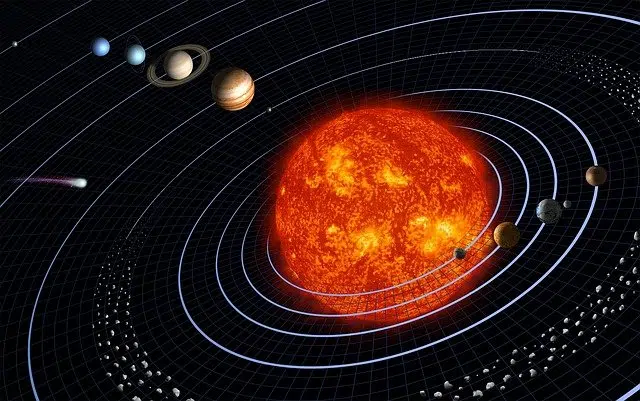
A planetary system is made up of a central star and astronomical objects that orbit around it.
From the Latin systema, a system is an ordered module of elements that are interrelated and interact with each other. The concept is used both to define a set of concepts and real objects with organization.
Differences between conceptual system and real system
A conceptual or ideal system is an organized set of definitions, symbols, and other instruments of thought (such as mathematics , musical notation , and formal logic ).
A real system, on the other hand, is a material entity made up of organized components that interact in such a way that the properties of the whole cannot be completely deduced from those of the parts (called emergent properties).
Real systems include exchanges of energy , information or matter with their environment. Cells and the biosphere are examples of natural systems. There are three types of real systems: open (receives flows from its environment, adapting its behavior accordingly), closed (only exchanges energy with its environment) and isolated (does not carry out any type of exchange with its environment).
A general theory
General Systems Theory , for its part, is the interdisciplinary study that seeks the common properties of these entities. Its development began in the mid-20th century, with the studies of the Austrian biologist Ludwig von Bertalanffy . It is considered as a metatheory (theory of theories) that starts from the abstract concept of a system to find rules of general value.
General systems theory is also known by the name systems theory although it is abbreviated as TGS . Going deeper into its purposes, it aims to systematically discover the conditions , restrictions and dynamics of a system, as well as the principles that can be recognized and applied to other systems that belong to different fields and levels of nesting, to achieve equifinality. optimal.

The notion of system also appears in the field of computing.
It is important to note that this theory focuses on the study of principles and concepts whose application is very broad, unlike what happens with those that are related to a well-defined domain of knowledge. Furthermore, it establishes a clear distinction between active or dynamic systems and passive or static ones: the former are components or structures that are in full processing, while the latter relate to others in processes or behaviors.
The systems under study
The systems studied by the general theory are concrete and are distinguished by their complexity and unique nature. Before this search to find a metatheory that could address such varied levels of reality , other attempts had already taken place, among which dialectical materialism stands out, which took elements of materialism and realism from natural science and combined them with the Hegelian dialectic to achieve the same objective.
In the historical context of the 20th century, we can say that general systems theory represents a new attempt to find a series of laws and concepts that can be used to describe and interpret any type of real or physical systems. At the same time, they can be understood as the search to overcome many of the classic discussions typical of the world of philosophy in relation to knowledge, a group in which the following three disputes stand out: materialism against vitalism; reductionism against perspectivism; mechanism versus theology.
Since the paradigms proposed by general systems theory do not correspond to those of classical science, we must consider it emergent.
The notion in computing
The notion of computer system , very common in modern societies, can also be mentioned. These types of systems refer to the set of hardware, software and human support that are part of a company or organization.
The idea of a system, in this way, includes computers with the necessary programs to process data and the people in charge of managing it.
